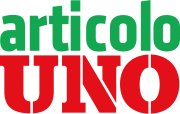Article One Articolo Uno | |
|---|---|
 | |
| Abbreviation | Art.1 |
| Secretary | Roberto Speranza |
| Coordinator | Arturo Scotto |
| Founded | 25 February 2017 |
| Dissolved | 10 June 2023 |
| Split from | Democratic Party |
| Merged into | Democratic Party |
| Headquarters | Via Zanardelli 34, Rome |
| Youth wing | Youth Movement of the Left |
| Ideology | Social democracy[1][2] Democratic socialism[3] |
| Political position | Centre-left[4][5] to left-wing[6][7] |
| National affiliation | Electoral list: Free and Equal (2018–2022) Democratic Party (2019) Democratic Party–IDP (2022) Coalition: Centre-left coalition |
| European affiliation | Party of European Socialists (observer) |
| European Parliament group | Progressive Alliance of Socialists and Democrats |
| Colours | Red Green |
| Website | |
| articolo1mdp | |
Article One (Italian: Articolo Uno, Art.1), officially Article 1 – Democratic and Progressive Movement (Articolo 1 – Movimento Democratico e Progressista, Art.1–MDP),[8][9] was a social-democratic political party in Italy.
Art.1 was formed in February 2017 by a left-wing split from the Democratic Party (PD)[10][11][12][13] and soon joined by a group of splinters from Italian Left (SI). The party was led by its secretary Roberto Speranza. Among its leading members are former Prime Minister Massimo D'Alema, former PD secretaries Pier Luigi Bersani and Guglielmo Epifani, and Arturo Scotto. Enrico Rossi, then President of Tuscany, was among the founding members, before returning into the PD one year later. In December 2017, Art.1 was a founding member of Free and Equal (LeU), a left-wing joint list for the 2018 general election.
Most of the party's members were formerly affiliated to the Democrats of the Left (DS). The name refers to article 1 of the Italian Constitution that defines Italy as "a democratic republic based on labour" (una Repubblica democratica, fondata sul lavoro) and affirms popular sovereignty.[11] The party was an observer member of the Party of European Socialists.[14]
Art.1 leader Speranza has served as Minister of Health in 2019–2022, in the second Conte government and the Draghi government.
- ^ Pascale, Alessandro (20 May 2017). "La (confusa) linea internazionale di Articolo 1 – MdP". la Città Futura (in Italian). Archived from the original on 17 August 2018.
- ^ Guerzoni, Monica (22 March 2017). "Articolo 1- Mdp presenta il simbolo:"I nostri fari? Democrazia e lavoro"". il Corriere della Sera (in Italian).
- ^ Parties and Elections in Europe. Books on Demand. 2021. p. 306. ISBN 9783754355848.
- ^ Schianchi, Francesca (25 February 2017). "Nasce "Articolo 1 - Democratici e progressisti": "Non ci facciamo mettere sulla ridotta"". la Stampa (in Italian).
- ^ Cristiano, Domenico (25 February 2017). "Nasce Articolo 1 – Movimento democratici e progressisti". LineaPress (in Italian).
- ^ Rizzini, Marianna (29 November 2017). "Nella caccia al dicembre rosso manca persino il nome "sinistra"". Il Foglio (in Italian).
- ^ "Com'è messa la sinistra fuori dal PD". Il Post (in Italian). 17 June 2017.
- ^ "MDP Statute" (PDF). Gazzetta Ufficiale (in Italian). 14 December 2017.
- ^ Statuto di Articolo UNO articolo1mdp.it (in Italian)
- ^ "Nasce Articolo 1- Movimento democratici progressisti. Speranza: "Lavoro e giovani prima di tutto"". la Repubblica (in Italian). 25 February 2017.
- ^ a b Stefanoni, Franco (25 February 2017). "Ecco il nome degli ex Pd: Articolo 1 Movimento dei democratici e progressisti". Corriere della Sera (in Italian).
- ^ Gagliardi, Andrea (25 February 2017). ""Democratici e progressisti" il nuovo nome degli ex Pd. Speranza: lavoro è nostra priorità". Il Sole 24 Ore (in Italian).
- ^ Binelli, Raffaello (25 February 2017). "Nasce il Movimento democratici e progressisti". Il Giornale (in Italian).
- ^ "Members".